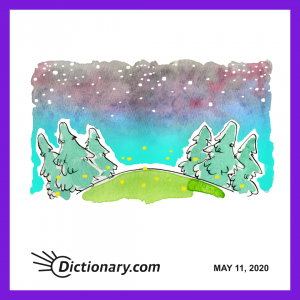Word of the Day
crepuscular
adjective
of, relating to, or resembling twilight; dim; indistinct.
More about crepuscular
The euphonious adjective crepuscular, “relating to twilight, dim,” is a derivative of the Latin noun crepusculum “(evening) twilight, dusk” (its opposite, “morning twilight, dawn,” is diliculum, very rare but euphonious in its own right). Crepusculum is most likely a derivative of the adjective creper “obscure, doubtful, uncertain,” of obscure, doubtful, uncertain etymology. Crepuscular entered English in the mid-18th century.

how is crepuscular used?
At dusk the full moon began its rise in the crepuscular light and its glowing would last the entire of that night until it set at dawn.
The whisper of his conviction seemed to open before me a vast and uncertain expanse, as of a crepuscular horizon on a plain at dawn—or was it, perchance, at the coming of the night?
Watch crepuscular as the word of the day
crepuscular


materfamilias
noun
the mother of a family.
More about materfamilias
Materfamilias, “the mother of a family,” is not very common in English, even less common than paterfamilias “the male head of a family, householder.” Materfamilias comes from Latin māterfamiliās, a compound of māter “mother” (nominative singular) and familiās “of a family” (the archaic genitive singular of the noun familia, which in classical Latin is familiae). Māterfamiliās is often written in Latin as two words (māter familiās). Materfamilias entered English in the mid-18th century.
how is materfamilias used?
I do not know a more hard-worked, driven creature than the ordinary Materfamilias at the seaside, more especially if she has left her own large airy house, with its nurseries and schoolrooms, and taken lodgings at a fashionable spot, where every inch of space costs pounds, and where she can never rid herself of her family for one moment.
Uncle Dikran … took Shushan’s side in every family dispute, knowing better than to disagree with the omnipotent materfamilias.
materfamilias


aeolian
adjective
of or caused by the wind; wind-blown.
More about aeolian
The chief element of the adjective aeolian is the proper noun Aeolus, the entity, whether human, divine, or semidivine, in charge of and controlling the winds. Aeolus lived on one of the Aeolian (Lipari) Islands in the Tyrrhenian Sea just a little north of Sicily. English and Latin Aeolus derives from the Latin adjective Aeolius “connected with, derived from, or descended from Aeolus,” from Greek Aiólos, a proper noun use of the adjective aiólos “quick, nimble.” Aiólos first appears on a Linear B tablet from about the 13th century b.c. as aiwolos, the name of a cow. (Linear B was the very inefficient writing system used for Mycenean Greek in the Late Bronze Age.) The next occurrence of aiólos is much, much grander: It is the second half of the Homeric compound adjective korythaiólos “quickly moving the helmet; with flashing helmet,” part of the poetic formula korythaiólos Héktōr “Hector with the flashing helmet.” Aeolian entered English in the 16th century.
how is aeolian used?
Between June and October, subtropical tempests sweep over the landscape, creating aeolian forms—corrugated ridges caused by wind erosion.
before the words of these volumes can be enjoyed, the spirit must hear the roar and thunder of the breakers of passion in the distance … and drink in his ear aeolian murmurings, and music from the thrill of spirit wings through the clear marble air.
aeolian





